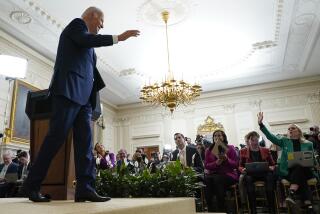As Peace and Prosperity Outlook Turns Gloomy, a 2nd Term May Not Be a Cinch : Politics: Despite the President’s high approval rating, some Democrats grow optimistic as the White House confronts oil problems and a recession.
- Share via
WASHINGTON — Don’t get this wrong: Nobody is saying the George Bush presidency is finished. His approval rating could hardly be higher, and no Democrats are falling all over themselves to get into the race to oppose him two years from now.
But, at this early date, some politicians as well as political scientists are beginning to consider a George Bush reelection victory in 1992, should he seek a second term, as something less than the foregone conclusion it may have appeared to be just two months ago.
Democrats who believe their chances are improving may be unrealistically optimistic. Nevertheless, for the first time in Bush’s White House tenure--a two-year period marked by almost unprecedented presidential popularity--the outlook for the continued peace and prosperity on which presidents must run for reelection has suddenly turned gloomy.
“People are starting to talk about these things. For the first time, people are thinking about what we are going to run on, the platform, what if we go into a recession,” a senior White House official acknowledged Friday.
Added one decidedly unpessimistic Democratic strategist, “Anyone who thinks Bush is a cinch is crazy.”
To be sure, similar suggestions about an incumbent President’s weakness were made eight years ago, when the nation was in the depth of its most recent recession and Ronald Reagan was in the middle of his first term.
“If the presidential election had been held in 1982, Reagan couldn’t have been elected dog catcher,” said the Democrat, a party activist who played important roles in each of the past four Democratic presidential efforts, three of which his party lost.
A public opinion poll taken in September, 1982, for example, showed that 48% of those surveyed disapproved of Reagan’s performance and 42% approved--a sharp decline from his initial popularity. Two years later, with the economy on the rebound, Reagan defeated Democrat Walter F. Mondale by a margin of 59% to 41%. And in a survey released two weeks ago, Bush was faring considerably better than Reagan was eight years ago: The President’s approval rating was 68%.
Still, not since 1980 and the ill-fated presidency of Jimmy Carter has the triple whammy of war in the Middle East, a recession at home and spiraling oil prices had the potential to raise among voters the concern that the White House has lost control over the country’s future.
In 1988, with the state of the world and the state of the economy looking much more secure than they do today, Bush’s campaign manager, Lee Atwater, said, “The more important that peace and prosperity become, the better it is for George Bush.”
After two years of a Bush presidency, they are even more important.
“These are much more than transitory issues. They may hold the key to 1992,” said Samuel Kernell, a professor of political science and an expert on the presidency at UC San Diego. “If something bad happens in the Middle East or the budget, and Bush assumes responsibility with Congress, then ’92 becomes much more problematic for him.”
Certainly, Bush and his advisers, a group that includes such practiced politicians as Secretary of State James A. Baker III, Bush’s 1988 campaign chairman, and Defense Secretary Dick Cheney, a former White House chief of staff and House minority leader, have privately recognized the geopolitical importance of Operation Desert Shield. They have expressed among themselves the need for it to succeed if the United States and its allies are to prevail in the future against dictators and would-be dictators. But the deployment of more than 150,000 troops in the Persian Gulf region carries with it a domestic political weight, too.
The Administration is said to be so sensitive to possible political repercussions that some on Bush’s national security team are said to feel that an “October surprise” attack on Iraqi positions should wait until after the Nov. 6 congressional elections. That way, voters will not go to the polls with images of battlefield deaths fresh on their minds.
But even the horrors of warfare, suggested Norman Strauss, a former adviser to British Prime Minister Margaret Thatcher and a lecturer on leadership issues, could be neutralized politically if, in retrospect, a battle with Iraq is seen as one defending Western ideals.
“Any stance which can be portrayed as a picture of what our countries stand for can win elections,” he said.
On the domestic front, the failure on the part of the Congress and the White House after a summer of negotiations to reach a budget agreement has left both sides scrambling to avoid blame. Bush made it clear in political appearances Wednesday and Thursday that he was not ready to be the fall guy and that he was willing to make a political issue of it.
“There may be senior citizens wondering why their Social Security checks are late,” Bush said Thursday at a Republican fund-raising breakfast in Minneapolis, citing a federal program that could be damaged by automatic cuts scheduled to take effect Monday if a deficit-reducing agreement is not reached by then. “We can’t afford business as usual. The American people deserve better.”
In addition, the White House demonstrated its sensitivity to the political pitfalls it may face as a result of oil prices topping $40 a barrel when it announced on Wednesday new plans to sell oil from the U.S. Strategic Petroleum Reserve in an effort to hold down soaring energy costs.
The decision to tap the oil reserves reflects, in the view of some insiders, the degree to which energy prices, coming on top of a recession, could complicate the political picture.
With the possibility that the threat of war, recession and oil-fired inflation will face voters in 1992, “you can make the ‘time-for-a-change’ argument and potentially make it stick because the country is looking for a change in direction, a new focus,” said a former White House official who has maintained close contact with the Bush Administration.
White House officials and others close to Bush insist that they are not worried. They say several factors remain so uncertain that they actually could end up helping Bush, rather than throwing a roadblock in the path of a 1992 election campaign.
For one thing, the Middle East turmoil is very much unresolved, and a peaceful solution is not out of the question. Meanwhile, even if the economy continues to slip into recession, there could be plenty of time for it to bounce back. Finally, oil prices could stabilize or fall.
“There’s just no way this far ahead to know what it will look like in 1992,” said Robert Teeter, Bush’s chief poll-taker. “If we achieve all of our objectives and come out of the Middle East and unemployment is 5%, people will say everything is terrific.”
Times staff writers Robin Wright in Washington and Tom Redburn in Boston contributed to this story.
More to Read
Get the L.A. Times Politics newsletter
Deeply reported insights into legislation, politics and policy from Sacramento, Washington and beyond. In your inbox twice per week.
You may occasionally receive promotional content from the Los Angeles Times.










